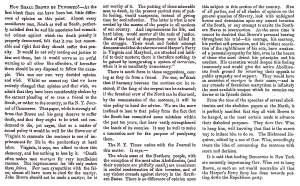Record Data
Transcription
The following text is presented here in complete form, as it originally appeared in print. Spelling and typographical errors have been preserved as in the original.
HOW SHALL BROWN BE PUNISHED? – At the first blush there can have been but little difference of opinion on this point. Almost every considerate man, North as well as South, perfectly satisfied that he and his associates had committed crimes against which the death penalty is properly denounced, felt that it was but reasonable and right that they should suffer that penalty. It would be not only meting out justice to him and them, but it would serve as an awful warning to all other like offenders, if hereafter there should be any disposed to follow the example. This was our very decided opinion and wish. Whilst we cannot say that we have entirely changed that opinion and that wish, we admit that they have been considerably shaken by the earnest pleading of so true a friend to the South, or rather to the country, as the N. Y. Journal of Commerce. That paper, while it strongly affirms that Brown and his gang deserve to suffer death, and that they ought to be tried and condemned to die, yet urges, that as a matter of sound policy it would be well for the Governor of Virginia to commute the sentence to one of imprisonment for life in the penitentiary at hard labor. Virginia, it says, can afford to show this clemency, and has nothing to lose by it. “Death often makes men martyrs for very insufficient reasons. But imprisonment for life only makes them felons. Few men sympathize with the felon; almost all have tears to shed for the martyr. John Brown should not be made a martyr; he is not worthy of it. The putting of these miserable men to death, in the present excited state of public feeling, would exasperate, instead of giving time for cool reflection. The latter is what is now needed by the masses of the people in all sections of our country. And imprisonment for life, and hard labor, would answer all the ends of justice. Most of the band of desperadoes were killed in the struggle. Their weak and foolish attempt demonstrated that the slaves around Harper’s Ferry in Virginia and Maryland, are attached and faithful to their masters; there is therefore nothing to be gained by inaugurating a system of terrorism, when it is so manifestly unnecessary.”
There is much force in these suggestions coming as they do from a friend. For one, we think that if harmony between the sections can be restored; if the fang of the serpent can be extracted; if the fanatical crew of the North can be disarmed, by the commutation of the sentence, it will be wise policy to heed the advice. We are the more inclined to lean to that policy from the fact that the South has committed some mistakes within the past ten years, that have vastly strengthened the hands of its enemies. It may be well to make a concession now for the purpose of paralyzing them.
The N. Y. Times unites with the Journal in this matter. It says, --
The whole mass of the Northern people, with the exception of the most ultra Abolitionists, (and their numbers are pitifully small,) are unanimous in cordial condemnation of this invasion, and of any violent crusade against slavery in the Southern States. There is no difference of opinion upon this subject in this section of the country. Men of all parties, and of all shades of opinion on the general question of Slavery, look with unfeigned horror and detestation upon any armed invasion of the South, or any attempt to excite the Southern Slaves to insurrection. At the same time it cannot be doubted that Brown’s personal bearing throughout his trial – his courage, his courtesy, his perfect self-pessession [possession], and his evident conviction of the rightfulness of his acts, have awakened a personal sympathy for him, even in the hearts of those who most detest his principles and his conduct. His execution would deepen this feeling immensely and would give the active Abolitionists fresh ground for renewing their appeals to public sympathy and support. They would have an accession of martyrs to their cause, - and in any crusade of fanaticism martyrdom is infinitely the most available weapons which its enemies can devise or its friends desire.
From the tone of the speeches of several abolitionists and the abolition papers at the North, it is perfectly manifest that they all wish Brown to be hanged, as the most certain mode to advance their diabolical purposes. They dare Gov. Wise to hang him, well knowing that that is the surest way to induce him to do so. The Richmond Enquirer, edited by a son of Gov. Wise, accordingly treats the idea of commuting the sentence with scorn and derision.
It is said that leading Democrats in New York are earnestly importuning Gov. Wise not to hang Brown, as such an act would neutralize all that the Harper’s Ferry foray has done towards putting down the Republican party.




